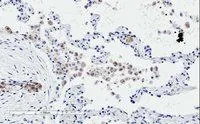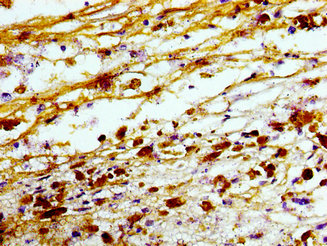
IHC-P analysis of human lung using GTX89017 TREM2 antibody, C-term. Antigen retrieval : citrate buffer pH 6 Dilution : 2μg/ml
TREM2 antibody, C-term
GTX89017
ApplicationsImmunoHistoChemistry, ImmunoHistoChemistry Paraffin
Product group Antibodies
ReactivityHuman
TargetTREM2
Overview
- SupplierGeneTex
- Product NameTREM2 antibody, C-term
- Delivery Days Customer7
- Application Supplier NoteIHC-P: 2-4microg/ml. *Optimal dilutions/concentrations should be determined by the researcher.Not tested in other applications.
- ApplicationsImmunoHistoChemistry, ImmunoHistoChemistry Paraffin
- CertificationResearch Use Only
- ClonalityPolyclonal
- Concentration0.50 mg/ml
- ConjugateUnconjugated
- Gene ID54209
- Target nameTREM2
- Target descriptiontriggering receptor expressed on myeloid cells 2
- Target synonymsAD17, PLOSL2, TREM-2, Trem2a, Trem2b, Trem2c, triggering receptor expressed on myeloid cells 2, triggering receptor expressed on monocytes 2, triggering receptor expressed on myeloid cells 2a
- HostGoat
- IsotypeIgG
- Protein IDQ9NZC2
- Protein NameTriggering receptor expressed on myeloid cells 2
- Scientific DescriptionThis gene encodes a membrane protein that forms a receptor signaling complex with the TYRO protein tyrosine kinase binding protein. The encoded protein functions in immune response and may be involved in chronic inflammation by triggering the production of constitutive inflammatory cytokines. Defects in this gene are a cause of polycystic lipomembranous osteodysplasia with sclerosing leukoencephalopathy (PLOSL). Alternative splicing results in multiple transcript variants encoding different isoforms. [provided by RefSeq, Nov 2012]
- ReactivityHuman
- Storage Instruction-20°C or -80°C,2°C to 8°C
- UNSPSC41116161






![TREM2 antibody [HL1738] detects TREM2 protein at cell membrane and cytoplasm by immunofluorescent analysis. Sample: THP-1 cells were fixed in 4% paraformaldehyde at RT for 15 min. Green: TREM2 stained by TREM2 antibody [HL1738] (GTX637386) diluted at 1:250. Blue: Fluoroshield with DAPI (GTX30920).](https://www.genetex.com/upload/website/prouct_img/normal/GTX637386/GTX637386_T-44781_20221021_ICC_IF_22110201_676.webp)
![Untreated (–) and treated (+) THP-1 whole cell extracts (30 μg) were separated by 12% SDS-PAGE, and the membrane was blotted with TREM2 antibody [HL1739] (GTX637387) diluted at 1:250. The HRP-conjugated anti-rabbit IgG antibody (GTX213110-01) was used to detect the primary antibody, and the signal was developed with Trident ECL plus-Enhanced.](https://www.genetex.com/upload/website/prouct_img/normal/GTX637387/GTX637387_T-44781_20221118_WB_treatment_PNGaseF_22112219_839.webp)
![Non-transfected (–) and transfected (+) 293T whole cell extracts (30 μg) were separated by 12% SDS-PAGE, and the membrane was blotted with TREM2 (R47H Mutant) antibody [HL1032] (GTX635872) diluted at 1:5000. The HRP-conjugated anti-rabbit IgG antibody (GTX213110-01) was used to detect the primary antibody.](https://www.genetex.com/upload/website/prouct_img/normal/GTX635872/GTX635872_T-44158_20230203_WB_multiple_B_23020621_651.webp)